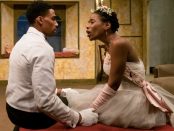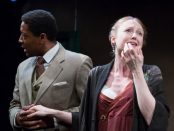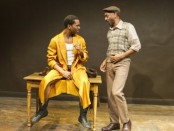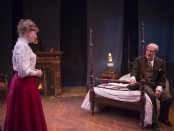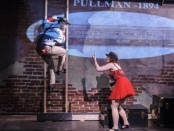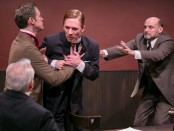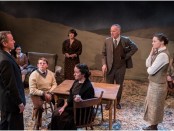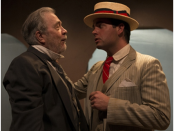Metropolitan Playhouse
Under the leadership of Artistic Director Alex Roe since 2001, the nineteen-year-old company has grown into an institution recognized for both artistic excellence and cultural significance. On the one hand, it is a window into the character of the time of its creation. On the other, it is always contemporary, because every performance of a play is a new creation for its own time. Connecting us with our past in the light of our present, America’s theater gives invaluable insight into our cultural identity. Visit metropolitanplayhouse.org for full details
The problem with rediscovering lost plays from the past is that works that are 100 years old may have gotten dated or express views no longer held. Back in the 1920’s, Harlem Renaissance author Eulalie Spence wrote a great many prize-winning one acts for which she could not get full productions. Metropolitan Playhouse is correcting that oversight by offering an evening of three of these entitled "She's Got Harlem on Her Mind." Unfortunately, they play like short stories rather than fully formed plays. As the characters are mainly grifters and con-artists, they do not show African-American life in the 1920’s in a very good light. A great deal of care and thought has gone into Timothy Johnson’s production which is set in 1927 including period songs between the plays and before and after, but his direction is often too slow and much of the acting is too studied to be naturalistic. [more]
The Sea Lady
Neith Boyce’s "The Sea Lady," a Broadway-bound play in 1935, only now having its world premiere at Metropolitan Playhouse is an attempt at a Shavian play of ideas. Based on a 1901 novel by socialist H.G. Wells, this very Edwardian story resembles Shaw’s "Misalliance" but without the wit or the scope of ideas. Extremely tentative in how far it dares to go, "The Sea Lady" seems like a relic of an earlier age. It has charm but it lacks depth; its message may have been new in 1901 when the novel came out or 1935 when the play was finished, but today it seems extremely old hat. [more]
Radium Girls
D.W. Gregory’s docudrama "Radium Girls" being given its New York premiere after a run in New Jersey over 20 years ago attempts to put the story and subsequent lawsuits on stage. Part of the problem with the stage version is the use of ten actors to play 36 parts with five playing up to seven roles each, making it difficult to keep straight who is who. Possibly more damaging is the languid, studied direction by Laura Livingston. The second act which leads up to the lawsuits is somewhat quicker and more engaging but at two hours and 20 minutes the play is too crammed with characters and data for its own good. A recent film based on the same story appears to have been defeated for other reasons. [more]
Thunder Rock
It is not difficult to see what attracted Metropolitan Playhouse to Ardrey’s drama: its message that one cannot shut one’s self off from the problems of the world as the America First movement wants to do is very timely once again as in the 1930’s, and the refugees who appear in the play’s second act and speak of their hopes and dreams in the new land are a stinging rebuke to those who would shut the golden doors to foreigners seeking asylum in the United States in our own time. [more]
The Poor of New York
One of the theater's most skilled 19th-century melodramatists, Boucicault was uninterested in the finer points of history, character development, or narrative objectivity which, of course, is why, as the Metropolitan Playhouse's lively revival of "The Poor of New York" demonstrates, his works are often so much fun. That doesn't mean they're untruthful; it's just that Boucicault wasn't prone to letting a bunch of cumbersome details and ho-hum dramaturgical considerations get in the way of a good story or a necessary cause. But if you're aching to learn how Andrew Jackson's monetary policies and the peculiarities of his personality might have contributed to a downturn in the American economy, there's always the hope Aaron Sorkin will eventually write that play. [more]
Shadow of Heroes
While Alex Roe’s minimalist production is both sharp and engrossing, the play offers viewers several problems. Aside from the three main characters, the play has 23 other speaking roles with actors doubling and tripling in multiple roles. Those unfamiliar with the Hungarian names as well as the history may have trouble following the twisty drama as the events pile up. Ardrey uses the awkward device of a narrator actually called the “Author” (played by Joel Rainwater) which helps a greatly but this also leads to a good deal of excess information. At almost three hours, "Shadow of Heroes" is an investment in time but it does pay off in the end. There are very few plays since Shakespeare which attempt as this one does to dramatize such a large chunk of history on stage. [more]
You and I
While Barry was to become famous writing plays about the very rich, the Whites are of the middle class and live on earned money. In the play’s second act, eight months have passed, and money, not so surprisingly, has become tight for both Maitland and Ricky. However, this would be fine if the artificial style of the play and the dated twenties slang did not seem arch and affected. And while director Michael Hardart’s production is always stylish and graceful, he has not helped greatly with his casting or his mannered and theatrical approach to the material. The characters talk in an elevated, literate language but they are basically very simple people, not the kind who sit around tossing off bon mots. Here they speak Barry’s realistic lines as though they do. [more]
The Jewish King Lear
Aside from being a tight domestic drama, The Jewish King Lear has several other differences from Shakespeare’s tragedy. Gordin’s Lear has a wife who is sorely put upon and under her husband’s thumb, as well as the old traditions. Gloucester and his sons are eliminated and Kent and the Fool are combined as Trytel, the steward, who often “rhymes like a real wedding jester.” Taybele, the Cordelia character, gets ahead through education and science rather than marriage to a noble. Gordin’s Lear is not only an advocate for the Jewish traditions of his forefathers he is also very much opposed to scientific advances and education for women, shades of Ibsen who was writing at the same time as Gordin. Dovidl’s heath speech does not take place outdoors but in his own house, now ruled by his son-in-law who has replaced him. [more]
A Marriage Contract
Originally titled "A Test Case" when the play had its premiere in New York in 1892, it is one of Daly’s many adaptations of European successes, this one based on a German comedy of Blumenthal and Kadelburg. While "A Marriage Contract" is a charming evening and has much satire that is still relevant, its genre is that of drawing room comedy. While stylish and graceful, Alex Roe’s production is much too broad to be entirely successful. Several of the actors give over-the-top characterizations of recognizable types which somewhat unbalances the play. In the manner of the popular form of 19th century popular theater, the play is a bit too long for its content and could use a bit of trimming. Nevertheless, the production is entertaining though many of the surprises are telegraphed long in advance of their revelations on stage. [more]
The Climbers
The play isn’t just about social climbers but those who want to game the system and live beyond their income, and their sense of entitlement rivals that of the 1990’s. However, this is 1901 and there is also a social hierarchy of who is in and who hasn’t made it yet. And these aren’t the robber barons with unlimited incomes, but people further down the economic scale hoping to make a killing by speculating on the market. Like a novel by Henry James or Edith Wharton, this turn of the century social drama encompasses a good many characters and events and includes both comedy and tragedy. The current almost three hour time length would have been longer at the beginning of the last century as there would have been more intermissions in this four act play, but in those days playgoers liked getting their money’s worth. [more]
On Strivers Row
Like in a Noel Coward comedy, the witty zingers come fast and furious: “That her big white Cadillac looks like a pregnant Frigidaire,” “Did you say she was from Newark or Noah’s Ark?”, “Harlem has gotten to be such a cesspool of nobodies,” “You can’t raise a rose in a junkyard,” “The ribbon around your neck is loose. Tighten it.” It also offers some very wise statements on the relationships between men and women: “women grow old from neglect and not from age,” “Regardless of how bad we women look in the morning, Oscar, we never wake up needing a shave,” “She loves the ground he staggers on.” However, the play also makes clear the rivalry between various Black enclaves: Harlem, Brooklyn and Washington, D.C. Dolly, Tillie and Mrs. Pace make pronouncements on the classiness of each. [more]
End of Summer
While S. N. Behrman was one of the leading Broadway playwrights from the twenties through the early sixties, he went into an eclipse after his death in 1973. Since 2000, however, there have been New York revivals of his major comedies "The Second Man," "Biography," "No Time for Comedy" and "Rain from Heaven." Set in the living room of a summer cottage on an estate in Northern Maine where the rich Frothinghams go to get away from the problems of the world, circa 1936, End of Summer resembles Chekhov’s "The Cherry Orchard" in that they both concern wealthy people refusing to recognize the changing social order. However, S. N. Behrman’s play is very much a comedy with its cool, urbane witticisms and very American in its outlook and content. [more]
O’Neill (Unexpected): Two Early Plays by Eugene O’Neill
"Now I Ask You" turns out to be comedy of pretentious New York bohemians in 1916, while "Recklessness" is a Strindbergian psychological revenge play. While both have hints of the more famous plays to come, they also stand on their own as the work of a major playwright trying to find his own voice. Whatever you think of the plays and whichever one turns out to be your favorite, Alex Roe’s staging is always entertaining and the plays are truly surprising and unexpected. [more]
Walk Hard
Imani’s production of 'Walk Hard" for Metropolitan Playhouse is an exciting piece of theater from an eye-opening rediscovery. Historically, it comes nine years after Clifford Odets’ 'Golden Boy" which covers similar content and 13 years before Lorraine Hansberry’s "A Raisin in the Sun" in which the Younger family fights a similar battle. Current racism condemned by the Black Lives Matter movement and much talk of income inequality in this election year make Walk Hard relevant once again at this time. [more]
Alison’s House
Metropolitan Playhouse has done itself proud with its revival of the rarely seen "Alison’s House." Alex Roe’s splendid production with its accomplished cast demonstrates the vitality of Susan Glaspell’s play as well as its contemporary relevance. This is a revival of the highest caliber. [more]
The Awful Truth
If this story sounds familiar, it is the plot of the classic thirties screwball comedy "The Awful Truth" which starred Cary Grant and Irene Dunne. In fact, Arthur Richman’s 1922 play of the same name has been filmed four times including a 1925 silent version, a 1929 sound version with original stage star Ina Claire which has been lost, and a 1953 musical version with Jane Wyman and Ray Milland. As part of its 24th Season devoted to “Hope,” Metropolitan Playhouse is producing the first New York revival of this unpublished play, surprisingly as the original production ran a successful 144 performances. [more]
Injunction Granted
The recent national rallies to raise the minimum wage have made the Federal Theater Project’s 1936 "Injunction Granted" relevant all over again. This play created by the Editorial Board of the Living Newspaper Unit of the FTP depicting the conflict of labor versus capital in the U.S. over almost 300 years turns out to be powerful theater in this revival by Metropolitan Playhouse. The third of the FTP Living Newspapers to be revived by this theater following "One-Third of a Nation" and "Power," Alex Roe’s lively and inventive production uses six actors to play 200 characters in a vaudeville-like atmosphere. [more]
The Indelible: The 11th Annual East Side Stories
Rodriguez, Brown and McNeill all go that extra mile to establish a connection - and make eye contact with every single audience member contained on the three sides of the theater. As they share their stories, the emotion and passion used to bring out the truth in each of these East Village residents is well translated from a period in time to the present day. While the historical elements are fascinating and provide context, the ultimate theme of acceptance, finding a guiding light to outshine the world's cruelty, and celebrating life creates a lasting impact. [more]
The Man of the Hour
While Broadhurst is most famous today for the Shubert theater named after him on 44th Street, in his own time he was an expert at light comedy and the author of 48 Broadway plays between 1896 and 1924. While The Man of the Hour is in no way an historical play, it does expose the excesses of New York’s Tammany Hall, the Democratic Party’s political machine, and parallels the election of 1897 in which Tammany Boss Richard Croker engineered the accession of Robert A. Van Wyck to the mayoral chair. Proof that reform of politics is on Broadhurst’s mind is that he refers to progressive leaders Wisconsin Senator Robert La Follett, Missouri governor Joseph W. Folk, and President Theodore Roosevelt, all of whom ran on platforms to clean up corruption. The reading text of The Man of the Hour actually indicates where the play’s Boss Horigan reiterates the policies and dictums of the real life Boss Crocker. [more]
Rollo’s Wild Oat
Michael Hardart, who piloted Metropolitan Playhouse's successful productions of "Within the Law," "A Man's World," "The Great Divide" and "Under the Gaslight," has staged this play as a drawing room comedy. However, as the plot will demonstrate the play is a farce and should be staged as such. While the play remains amusing, a great many of the jokes do not land as they ought to while some of the acting is much too genteel for this sort of play. [more]
Icebound
Up until now when the name of Owen Davis' 1923 Pulitzer Prize winner "Icebound" comes up, the response is likely to be a head shake that the year's prize did not go to a more worthy candidate like Eugene O'Neill, Elmer Rice, Sidney Howard, Philip Barry or George Kelly. Now with the Metropolitan Playhouse's revival of "Icebound," theatergoers can see for themselves what a trenchant and engrossing drama this actually is. [more]
Within the Law
What is the most famous play currently running in New York that you have probably never heard of before? Bayard Veiller's Within the Law, Metropolitan Playhouse's final entry in its "Justice" season, has been filmed six times since its Broadway debut in 1912, most famously as Paid with Joan Crawford, revived once on the main stem, and still packs quite a punch. [more]











